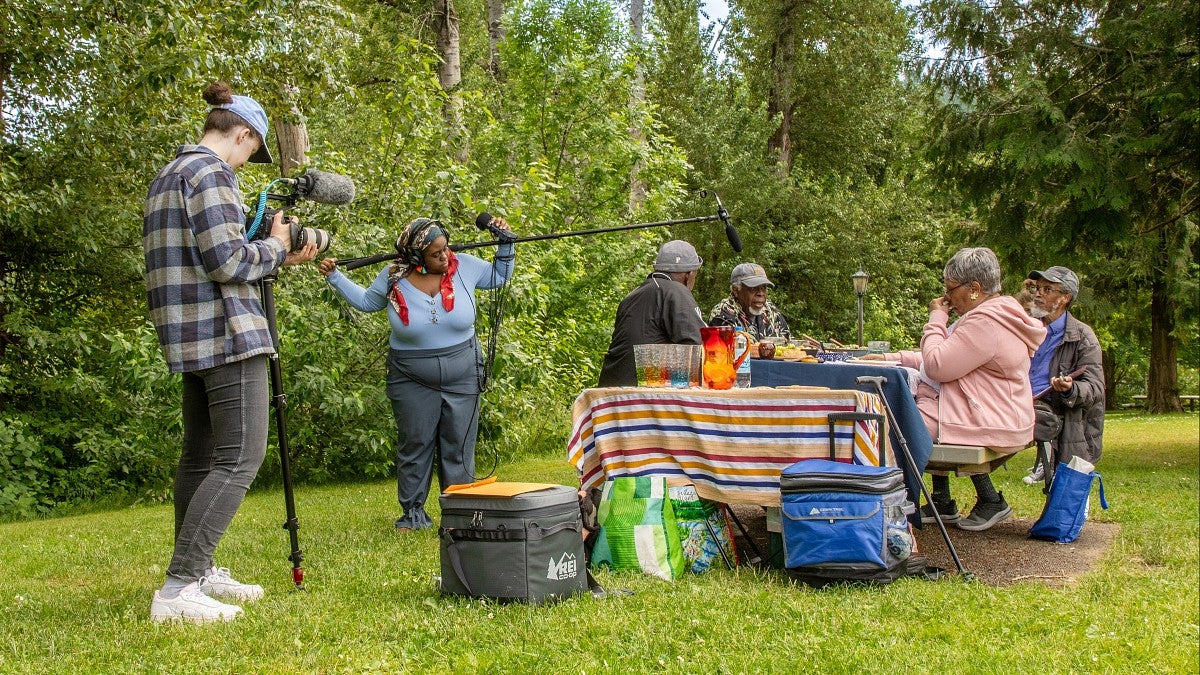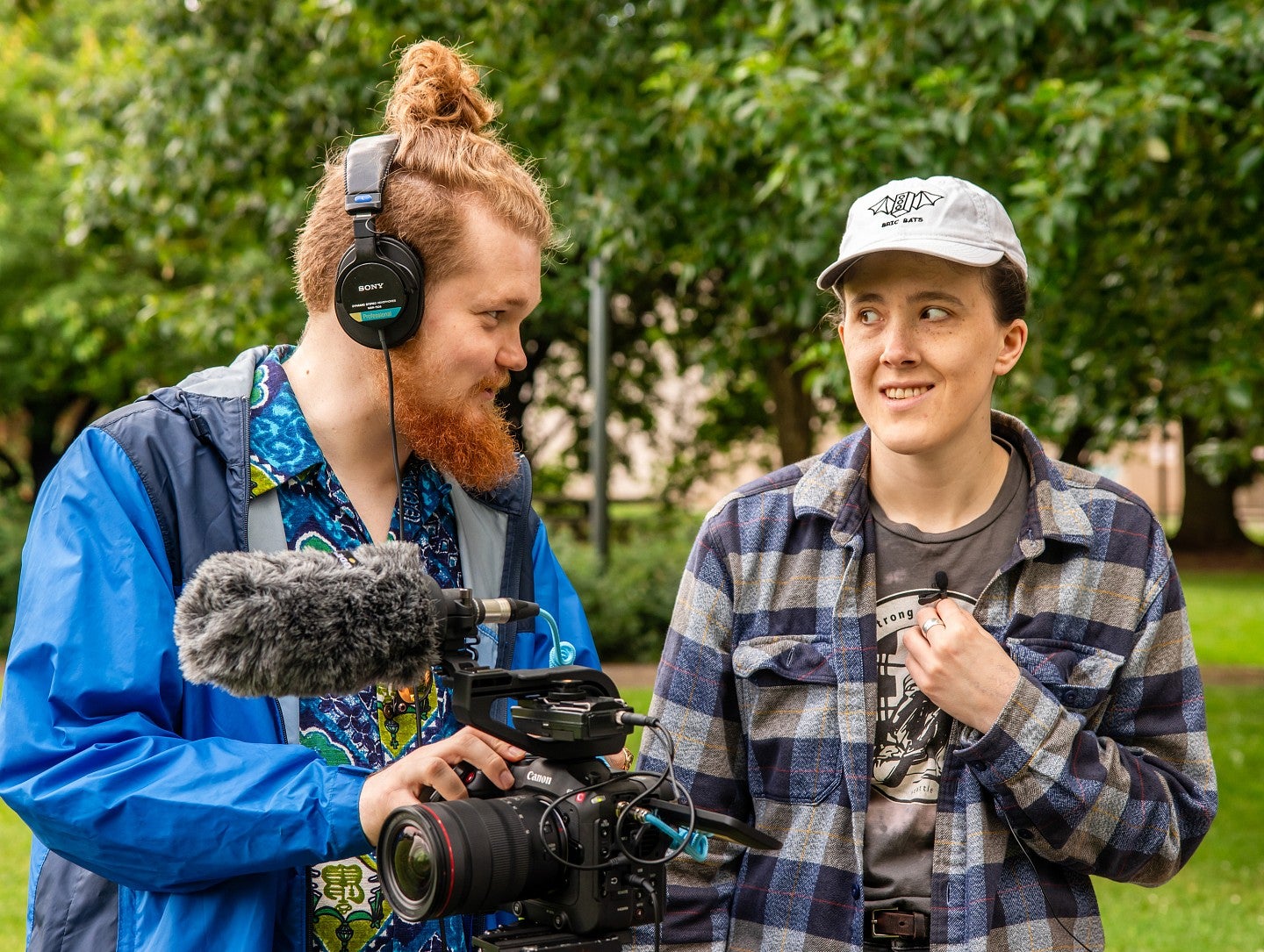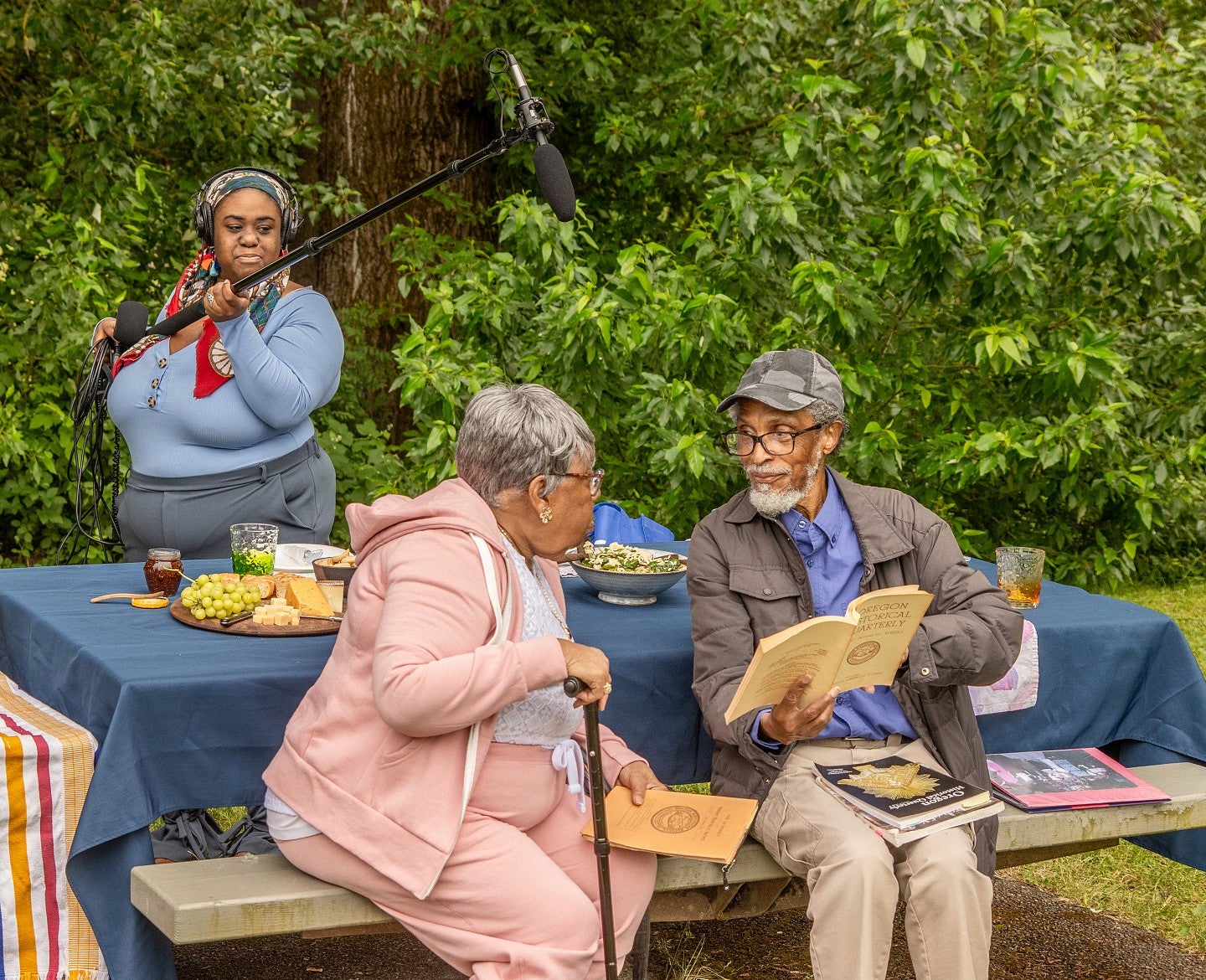
Rarely does an entire class in a communication master’s program work together on a single project. But directing, producing and editing a journalism documentary about the history of racism in Portland, Oregon, deserved the attention and skills of as many students as possible.
That’s why seven students in University of Oregon’s School of Journalism and Communication’s Multimedia Journalism Master’s (MMJ) program took the unique approach of pursuing one individual project together for their class, J-656 Producing the Story, taught by Ifanyi Bell.
Choosing subject of journalism documentary
The cohort brainstormed many topics for the documentary but ended up choosing the York Street Working Group. The York Street Working Group consists almost entirely of elder Black individuals who have lived in Portland for decades. They have experienced much of Portland’s racist history through displacement and injustice. In response to this, the York Street Working Group came up with an idea to foreground and celebrate the story of York through a village with a Black history museum and affordable housing on York Street in Northwest Portland.
The group is named after York, the first Black man to step foot in what would become Portland, Oregon during the Lewis and Clark expedition. He was enslaved by Clark.
“They take a lot of inspiration and solace in York’s story and want to make sure it's foregrounded and celebrated more,” said Anna Lueck, a member of the cohort.
Lueck is the one who suggested York Street Working Group as a topic. Her fellow cohort members responded with instant excitement. In years past, students in the cohort have split up and worked on separate projects, but Bell felt the approach of working together made sense for this cohort.
“This year has been unique in that I feel like everyone in the class has extremely complementary skills,” Bell said. “Very intuitive and very eager and energetic.”
Making the Remembering York journalism documentary

Once the cohort decided the topic, the York Street Working Group was eager to work with the students to bring more awareness to York and York Street. From there, it was time to get to producing. Each student was assigned to a member of the York Group to connect with.
It was important to ensure the group’s story was told in the way its members would want to feel represented. The students wanted to take an engaged journalism approach, meaning the production process would be relational between the students and the York Group rather than transactional. Their goal in producing the story was to show the people, history and hopes that create the York Group. They set up pre-interviews to learn more about each member and build a relationship with them, then moved on to formal interviews with each member.
Dana DeLaski, a student in the cohort, turned her living room into a production studio for each interview. DeLaski said that choosing a location to do several interviews was always going to be a bit of a challenge, as the interview space should be predictable in what it will look and sound like.
“I just thought that doing it at one of our houses would make a lot of sense because we would have all the flexibility and control over the space we needed,” DeLaski said. “We could take our time setting up and really figure it out.”
The students met at DeLaski’s house multiple times to set up and monitor cameras, lights and audio for each formal interview. The students rotated their roles in each interview, such as monitoring different cameras, lighting and sound, to maximize their production experience. However, the student who pre-interviewed a member of the York Group was also the one who conducted the formal, recorded interview with that member.
DeLaski said that she was at first a little nervous working with her whole cohort on one project, as it was unclear how it was all going to “shake out.”
“But I think it’s been amazing,” DeLaski said. “I think we are much closer as a cohort now than we’ve ever been. Everyone has really stepped up and is putting in the work, showing up whenever they can and giving it their all.”
Bell agrees.
“I think with this class, there's been a sense of independence, engagement and buy-in,” Bell said. “I think everyone in the class has really dug into the idea of the course.”
Lueck added that no individual person producing this project alone could do it justice.
Ethics in making journalism documentary

Aside from production logistics, the cohort has also worked together to consider ethical guidelines. Lueck and DeLaski noted that six of the seven members of the cohort are white, and no members are from Portland. The team continually discussed how to acknowledge this and work on potential missteps, but there is always the reality of ignorance and bias. The students also wanted to be sensitive when asking their subjects to talk about the racism and displacement they’ve experienced.
“It’s been a challenging project to work on,” Lueck said. “Not in any negative sort of way, but just wanting to be particularly trauma informed and mindful when our interviewees have experienced some pretty heavy trauma, and we’re asking them to relive it for these interviews.”
The same group of students took J-654 Reporting in Communities the previous term. That class taught the students some skills in ethical, community-based and engaged reporting and storytelling. DeLaski said the lessons taught in that class have been important and useful to apply to the York Group project.
“It’s inherently there. Obviously, you’d want to treat people with respect, but I wasn’t necessarily expecting to have such engaged and thought-provoking questions around how to be more ethical journalists,” DeLaski said. “I feel like we’ve done a good job of applying those lessons to this project.”
Finalizing the Remembering York journalism documentary
Following the formal interviews, the team captured more footage of the York Group members at meetings and gatherings. The students then had to come to a decision on how to edit the documentary to tell the story they set out to tell. Each student pitched a different treatment, which is a document that presents the story idea of the film. The students then voted and decided on a treatment plan they thought best suited the story and was possible to create during the remaining few weeks of the term.
They worked together to edit all the footage down to a cohesive story about the York Street Working Group and the individuals who are a part of it. However, the students believe that almost every story is still a work in progress. They plan to continue working on this project over the summer with the goal of adding a Native American perspective.
Watch the documentary, “Remembering York,” that the class created during the 10-week spring term.
–By Jane Glazer, BA'22, MA class of ’24
Jane Glazer received a bachelor’s degree in journalism from University of Oregon in 2022. She joined the Multimedia Journalism Master’s program in Portland to sharpen her production and storytelling skills and plans to graduate in spring 2024.
